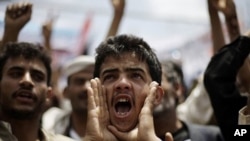Several people were reportedly killed and others wounded during intense fighting Thursday in a northern district of the Yemeni capital, Sana'a, as partisans of tribal leader Sheikh Sadek al-Ahmar and forces loyal to President Ali Abdullah Saleh fought for control of a key neighborhood.
Yemenis awoke to the sound of fighting in Sana'a again Thursday, as forces loyal to embattled President Ali Abdullah Saleh clashed with tribesmen supporting his bitter rival, Sheikh Sadek al-Ahmar.
Arab satellite channels reported that fighting was heaviest around the home of Sheikh Ahmar in the upscale Hasaba neighborhood of northern Sana'a. The sheikh's house was reportedly shelled, receiving a number of direct hits.
Other fighting took place around the positions of General Ali Mohsen al-Ahmar, who sided with protesters against Mr. Saleh, last spring. For months, protesters have been demanding that Mr. Saleh leave office,
Witnesses say the fighting led to an exodus of civilians from the Yemeni capital, amid ongoing power cuts, fuel shortages and scarcity of some food items. Thursday's clashes came after three days of a relative lull.
Opposition protesters were not deterred by the fighting, participating in large demonstrations and marches in several districts of the capital.
Official Yemeni government media reported that top Islamic clerics had issued a fatwa, or religious edict, saying that popular protests were illegal.
Greg Johnsen, a Yemen scholar at Princeton University, said that the president's supporters can now use the fatwa to justify using force against protesters.
"One thing that the president has done since returning from Saudi Arabia is attempting to get the religious scholars - or those religious scholars remaining loyal to him - to come up with a fatwa, or a religious opinion, essentially stating that the protests and the defections are outside the bounds of the constitution and outside the bounds of Islamic law and should be corrected and should be met with force. And so many people, myself included, are viewing this as sort of a bit of religious fig leaf that the president is going to use to further crack down on the protesters,” Johnsen said.
Fighting between the two sides has escalated over the past two weeks. On Wednesday, anti-government tribesmen shot down a government warplane near the capital.
Yemen's foreign minister has blamed the turmoil on the opposition's refusal to accept 2006 presidential results.
In the face of mounting protests this year, Mr. Saleh agreed three times to an Arab-Gulf proposal calling for him to step down. But he has backed out each time before it could be signed. He returned to Sana'a on Friday after a three-month stay in neighboring Saudi Arabia where he was recovering from an assassination attempt in June.




